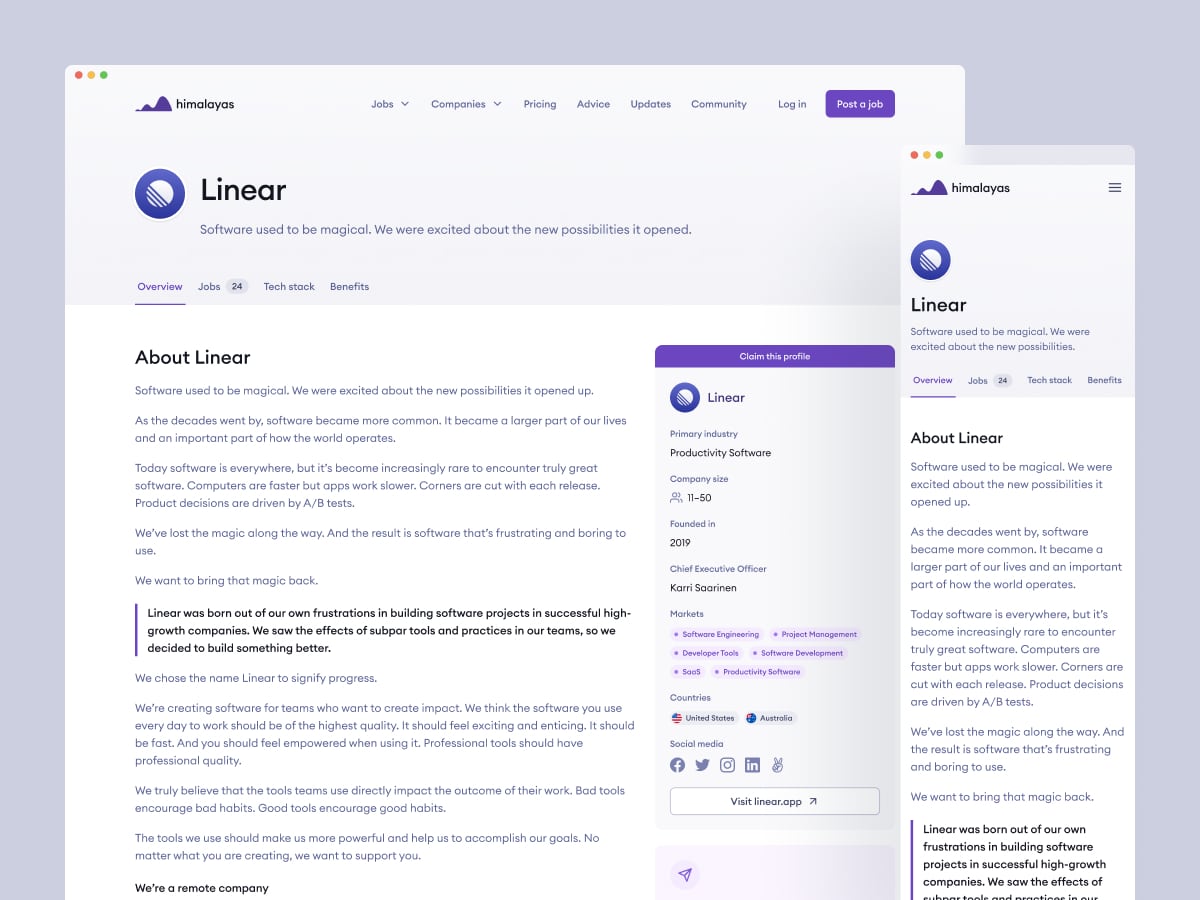"Why do you want to work remotely?" is a common question asked in job interviews. This question is particularly common for roles that are optional remote, meaning they're open to office workers and remote workers. For applicants who are new to remote working and have historically worked from a traditional office, hiring managers are often enquiring more acutely why you've decided that remote work is a good fit for you now.
If this sounds like you, don't worry! Before the COVID pandemic, 75% of the U.S. workforce had never worked from home before. Now, 97.6% of workers would like to work remotely forever and 1 in 3 U.S. employees plan to quit their job if they can no longer work remotely according to Global Workplace Analytics. Both employees and employers are waking up to the immense benefits of remote work and increased employee productivity, so hiring managers today expect preferences for remote work from applicants.
When interviewing for a remote job, there's a good chance you'll be asked this question. Like any interview, the best answer is a prepared one. Here are a few tips on how to best answer "why do you want to work remotely?"
Be sure to check out our guides on how to use the STAR method, common remote job interview questions, and how to find a remote job and get hired as well.

What the interviewer wants to know
Organizations are built on trust. This is especially important for remote teams because remote employees usually work on a more flexible schedule with more autonomy and freedom. It’s harder to build trust in remote teams because employees don’t have access to serendipitous encounters to spend work time face-to-face with coworkers.
Trust goes in many directions — organizations need to be able to rely on remote employees to work autonomously and do their best work, and employees rely on their team members so that collaborative work can happen. At the end of the day, most hiring managers conducting remote job interviews are trying to decide if you can be relied upon.
While remote working has a number of benefits for work-life balance and has been shown to increase employee productivity, it also comes with challenges. Often, these challenges are felt more acutely by remote workers who are new to the home office.
Hiring managers at remote-friendly companies are keenly aware of this, so they're motivated to assess your motives for remote work as well as your remote work skills. The question "why do you want to work remotely?" is less about whether or not you have the necessary skills for the role, but more about if you have the necessary skills to work remotely. As such, the best answers highlight why you do your best work at home and why you can be trusted to do so.
Hiring managers ask this interview question because they want to know that you have the skills to work remotely and that you can be trusted to work without direct supervision.

What the interviewer is looking for
Being successful in a remote workforce relies on having the specific skills and experience to do the job as well as a variety of important soft skills. These soft skills are what the hiring managers for remote jobs are looking for.
Remote work-specific skills that hiring managers are looking for are a mix of tangible and intangible skills that are essential to increased productivity. When answering "why do you want to work remotely?", keep in mind that the interviewer is likely looking for indications that you have these particular remote work skills:
- Self-motivation: Does this applicant have the internal drive to do their best work in a remote work environment? Even when they're not directly supervised? Or are they just looking to escape the daily commute?
- Time management: Will this applicant be able to manage their tasks and duties within reasonable work hours? Will they be able to maintain work-life balance or will they manage their work time poorly and burn out?
- Organization: Can this applicant be trusted to understand, manage, and organize their workload? Do they have project management skills and will they be able to reorganize tasks to push projects forward without blocking their team members?
- Ability to work independently: Does the applicant have and experience working autonomously? Will they be able to adapt to asynchronous communication and differences in timezones to their co-workers?
- Focus: Will this applicant be able to maintain focus in a remote work environment? Do they have a distraction-free home office space? Do they have the discipline to focus on deep work?
- Trustworthiness: Can this applicant be trusted to focus on their tasks during work time to the best of their ability? Can their co-workers trust them to deliver on timelines and work with autonomy?
- Initiative/resourcefulness: If this applicant doesn't know how to do something, are they able to figure it out themselves or reach out to someone who can help? Or will they sit around and do nothing?
- Synchronous and asynchronous collaboration: Does this applicant understand the difference and how remote teams collaborate and communicate?
- Ability to learn remote collaboration tools: Will this applicant have any troubles using our remote collaboration tools? If they haven't used them before, are they willing and able to learn? Read our article on remote collaboration best practices to learn how to overcome these challenges.
- High levels of emotional intelligence: Does this applicant have high EQ? Will they be able to keep their emotions and stress levels in check when dealing with some of the challenges of remote work and remote collaboration?
These skills are valuable in any work environment and are particularly important for remote work and remote collaboration.

How to answer "Why do you want to work remotely?"
You should approach preparing for a remote job interview over video chat just like you would prepare for a normal job interview. Hiring managers have the same motivation in both scenarios: they want to find applicants that are the right fit for the job and company as soon as possible.
The better prepared you are to communicate this, the better you'll look. Like any interview, you should also take some time to be prepared to answer behavioral interview questions. These are questions designed to reveal your problem-solving skills, abilities, personality, and whether you're the right candidate for the role. If the interview is a video chat, we also recommend checking out our Zoom interview tips.
If you follow the steps and example answers below, you'll dramatically increase your chances of making the right impression and getting hired.

1. Understand the job
There is no redder red flag than when a candidate clearly hasn't taken the time to research the job. Start by reading the job description in full (you'd be surprised how many people don't do this) and keep in mind any details that may help you answer why you want to work remotely for this role.
Specifically, think about how much remote collaboration will be involved with this role, what kind of remote skills you'll need, who you'll be working with and where are they distributed around the world, and what remote collaboration tools does the team use to work asynchronously.
If the company or team you'd be working with are fully remote, that's great for you and something you can focus on.

2. Research the company
You need to research the company prior to your interview. Regardless of what the hiring manager thinks, how will you know the job is a good fit for you if you don't understand who you're trying to join? Again, you'd be surprised how many applicants skip this rudimentary step.
For remote jobs specifically, a great way to stand out is to dive deeper into how the company operates as a distributed team and handles remote collaboration and communication.
A good place to start is with our remote company database. If the company has a public employee handbook, you've struck gold. Find interviews with team members and leadership, read blog posts, and spend some time understanding how the company operates on a cultural level. Look for any references to how the team thrives in a remote environment to support your answer. Not only will this knowledge help you shape your reply, but it'll help you prepare some insightful questions of your own.

3. Prepare for the question
Don't be caught off-guard by this question. There is no excuse for being unprepared, even if don't expect it to be asked in the interview process. The best interviews are conversational, so even if you've been given a list of questions to expect there is still a good chance the hiring manager will ask why you want to work remotely.
Everyone gets nervous during interviews, even the interviewer. Remember that hiring managers want the interview to go as well just as much as you do! When you're nervous, preparation will help calm your nerves and help you think more clearly during the interview.
Check our list of other remote job interview questions to prepare for.

4. Focus on the value you can add
Once you've researched the job and company, you'll have a deeper understanding of what's involved, how the team works remotely, and what the hiring manager is looking for.
Now it's time to start thinking through how you can provide value to the company. Use the research you've done combined with your previous experience to jot down some ideas on how this particular role and this company align with your interests, career goals, and skillset. Remember, the hiring manager is looking for how you can bring value to the company and to this role specifically. Think through how you can add value using the STAR method to make this as clear as possible for both you and the hiring manager.
Being able to clearly articulate the value you can add and why this role is exciting to you is crucial for acing any job interview. It's also essential for answering why you want to work remotely because you need to be able to tie how working from home help you deliver on this value.

5. Be clear and honest on why you're applying for the role
"Why do you want to work remotely?" is an open-ended question, but it's also very direct. Hiring managers genuinely want to know what your motivations are to assess if they align with the job and company.
Be clear and honest on why you're applying for the role. Maybe you want to skip the commute, have a flexible schedule, benefit from increased productivity, or find better work-life balance. These are great motivators and you should be upfront and honest about them.
Remote work has tonnes of great benefits for both employees and employers — if the role is open to remote, then the company is already sold on the upside. There's no need to try and hide your motivations. What's important is that you frame your motivations in such a way that makes it clear how these are mutually beneficial.

6. Don't focus on only the remote benefits of the job
It's important to remember that the hiring manager is looking for the best candidate for the role, not applicants that want to simply take advantage of the benefits of remote work. You don't want to make the impression that you're only applying for the role because you want to work from home — this is a big red flag for hiring managers because it indicates your motivations are misaligned with what they're looking for.
Remember to emphasize how working from home improves your job performance. This will set you apart from other people and make it clear you're the right candidate for the role.
For example, instead of simply stating that there are fewer distractions at home, focus on how fewer distractions and asynchronous communication allows you to focus on complex tasks and do deep work. Make it clear how remote work benefits both you and the company: in an office environment, it can take 20+ minutes to resume deep concentration after an interruption, and long meetings and impromptu disruptions from coworkers tend to drain work time, productivity, and focus from doing your best work.

7. Show confidence and a willingness to learn
If you've never worked from home before, don't worry. Like any new skill, job, or situation, what really matters (and what hiring managers are looking for) is that you're confident and willing to learn.
Before the coronavirus pandemic, 75% of the U.S. workforce had never worked from home before and most companies had little or no remote working policy or plan. The reality is most remote workers and companies are just winging it — we're still trying to figure out what works and what doesn't work when it comes to remote collaboration and working from home.
When you're having a conversation about why you want to work remotely, be upfront about anything you're unsure of and make it clear that you have the motivation and initiative to learn and to push past any challenges.

8. Be willing to compromise
More and more companies are open to remote work and working from home has never been more accessible. But like any big cultural shift, it takes time. If you don't get a definitive "yes" from the hiring manager when discussing why you want to work remotely, don't be deterred! As we mentioned earlier, remote work is built on a foundation of trust and this can take time to build.
If fully remote work is a new concept at the company, they may have a preference for in-office employees. If this is the case, a good idea is to suggest a trial period, or perhaps a hybrid remote arrangement where you work from home a few days per week. The correct approach will depend on how accepted remote work is at the company.
Being willing to compromise shows the hiring manager you care about the role and understand their viewpoint from a business perspective. Over time, let your increased productivity who how working from home is in their best interest as well and ask to work from home permanently.

9. Practice!
This might feel silly but practice your answer. Reading notes or a script doesn't translate to confidence and memory as well as rehearsing your response out loud. You're 100% not going to get it right the first time, so don't let that first time be in front of the interviewer.
Once you're ready, draft an answer to "Why do you want to work remotely?" Take your time and revisit the steps above to ensure you're aligning your motivations with the best interests of the company.
Don't put too much pressure into scripting the answer word-for-word, even just dot points will suffice. From there, practice answering the question over and over until you get it right.
You can even ask friends or family to play the part of the interviewer. Ask them to interrupt you and to ask follow-up questions so you can be ready for anything.
Another useful tip is to record your response once you're happy with it, along with responses to other interview questions you're expecting, and play it back to yourself in the days leading up to the interview. This will help you internalize it, relax, and gain confidence through preparedness.

Example answers to "Why do you want to work remotely?"
How you answer the interview question "Why do you want to work remotely?" will depend on your motivation for applying for the role. What matters is that you are clear on how working from home is mutually beneficial for the company as well.
This question is a great opportunity for you to demonstrate that you are highly self-motivated, can work independently and manage your time, and that you focus on increased productivity and output.
It's also a great question to differentiate yourself from other applicants. Don't fall into the trap of focusing only on remote benefits for you — instead, answer confidently how remote work is mutually beneficial.
Use these sample answers as a base and adapt them to suit your specific situation and role.

Example answer #1: Working from home makes you more productive and focused
"I want to work with the best team in the industry and there is no team better than Stripe. I genuinely love finding that flow state and getting lost working on complex design projects — this is where I do my absolute best work.
One of the reasons I want to work remotely is because I'm noticing more and more how distracting open offices are... I consider myself a pretty focused person, but I find it really hard to do good work when I'm in the office.
Interruptions from coworkers pull me away from what I'm working on and it can take 20 minutes to get that focus back. What ends up happening is my work takes longer, but I also know it's not the best it could be and the team at Stripe has set the bar high."
Why it works: This answer shows the hiring manager that you are focused, passionate, and highly self-motivated to be the best at your craft. You understand how you work best and that you're disciplined and self-aware enough to remove distractions. It also demonstrates that you've thought deeply about why you want to work at Stripe and genuinely want to work with their team.

Example answer #2: A flexible schedule allows you to work more productively
"I'm most focused in the early morning. I usually take this time to write content, tackle my most difficult work, and plan my day. Before I started working remotely at Dropbox, this time was wasted on a 45 min daily commute. I'm not sure why I have so much mental energy between 6 and 9 am, but it has been a game-changer better utilizing this time.
Having the flexibility to set my own hours when I'm the most mentally alert means I can get so much more done before my kids are up and the team starts their day."
Why it works: One of the main benefits of remote work is the flexibility and autonomy it provides. Remote workers can pick and choose hours where they work best to be their most productive. This is a great answer because it demonstrates how working from home is mutually beneficial for both you and the company. It's clearly a win-win if it's a game-changer for productivity and output. It also shows that you're able to work independently to manage your time and organize your day to be as productive as possible. It's also a strong signal that you're self-motivated and comfortable with asynchronous collaboration by working on projects before your team checks in.

Example answer #3: You value family time
"Last year, we made the decision to move from the city to the coast because it was better for the kids and their school. Since we've been working from the home office space, I'm not worried about leaving the office early to pick the kids up and I've been able to unlock focus and productivity I didn't know was possible.
Working remotely allows me to work more productively without distractions. I'm more organized and focused than I have ever been in my life, which is pretty important for project management! Working remotely in this role at Help Scout is important to me because I'm able to do my best work while also consistently clocking off and spending more time with my children. I didn't appreciate this kind of work-life balance that was possible when I was working in the office. The fact that real estate is cheaper here and there's no stressful peak hour commute time every morning is a bonus."
Why it works: This answer is perfect because it is genuine and honest! Employees have different values and motivations that attract them to remote working and wanting to spend more time with your kids is as good of a reason as any. It's also a great signal to hiring managers that you're highly motivated to make the arrangement work. By highlighting further how working remotely has enabled you to be more organized and focused makes the case even stronger and shows how remote work is mutually beneficial.

Example answer #4: The company values align with yours
"I've been following ConvertKit for a few years and love everything you're about and helping creators earn money online. It's super impressive you've managed to grow so fast with such a small team. What I'm particularly drawn to is your company's transparency on working in public and celebrating work-life balance as a 100% remote team — I truly believe this is the future of work and I want to get involved.
I thrive working asynchronously and do my best work when I can focus deeply on content writing and growth strategy. I feel like ConvertKit understands this — you only hire A-players and then let them do their best work from anywhere in the world. I'm good at what I do. I grew Hotjar's organic SEO traffic by 225% in less than a year and many of the same strategies I implemented will work for ConvertKit as well."
Why it works: Company values and culture are a valuable recruiting tool. For hiring managers, finding people who align with your public mission and values is a great signal. This is a great answer because it does just that. It shows that you've not only done your research, but you've been following the company for some time and genuinely align with how they work and what they value. Being able to back up how they can provide value with the quantitative impact they've had in a previous role is also a solid indicator that they understand what the role entails.

Possible follow-up questions
- Why are you interested in this position?
- Why do you want to work here?
- Do you have any questions for me? Read our guide on best questions to ask in an interview.
- What can you contribute to this company? This question is similar to "Why do you want to work here?" and will only be asked as a follow-up if you weren't able to clearly articulate your value in your answer.
- Any number of behavioral interview questions. Be sure to use the STAR method when answering.

Looking for a remote job or looking to hire remote talent?
If you've made it this far, there's a good chance you're either looking to find a remote job, already working remotely, or looking to attract remote employees.
Either way, we'd love to introduce ourselves. We're Himalayas, a remote job board, that is focused on providing the best experience for remote job seekers and employers.
Check out our remote jobs, use our remote company database, or sign up and create your free company profile here.







